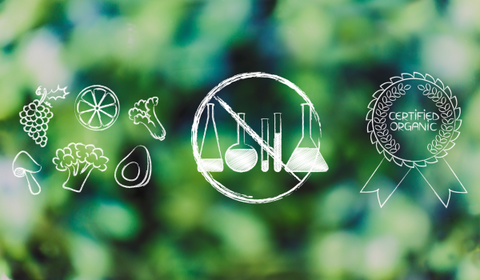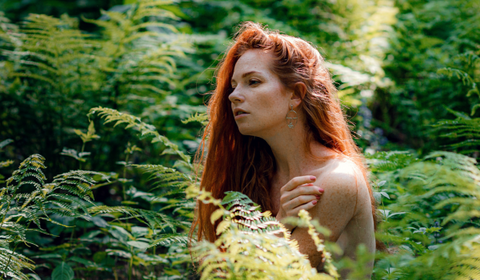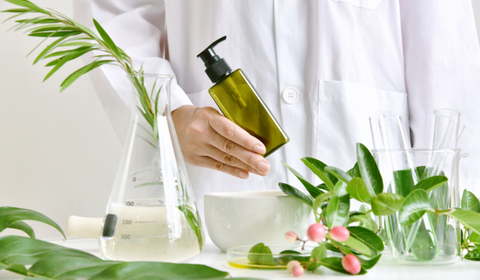In recent years, the word ‘clean’ has been used to describe several supposedly ‘healthy’ lifestyle trends.
‘Clean eating’ I believe came first and refers to the rejection of highly processed foods. Judging by a study released this February that found 32 damaging health conditions linked to eating ultra-processed foods, it seems this might not be a bad idea.
Walk through most town centres on a Friday night and it may not appear that the sober lifestyle is a particularly British trait. However, the concept of ‘clean living’ has gained momentum in the last few years, particularly with Gen Z, who seem to view alcohol differently from their parent's generation, and millennials, who are likely just reaching that age where the hangover hangs around all day. Whatever the reasons, younger people are generally drinking less, if at all, and those who’ve adopted ‘clean living’ are shunning other stimulants too.
Ever a perfectly manicured finger on the pulse, the beauty industry was, keen to jump on the trend and adopt its own version of ‘clean’ for the consumer. Enter, ‘clean beauty’. A term that alludes to a healthier, ethically conscious and purer way to approach cosmetics and personal care. One that has been adopted by advertisers, beauty bloggers, the magazine industry and social media influencers. But, just what is clean beauty? Is it a revolutionary approach spearheaded by cosmetics companies determined to do better, or is it another cynical campaign to convince the consumer of ethical brand values that in reality they fail to deliver on?
Allow me to share some of the secrets of the clean beauty movement and uncover the true nature of natural beauty across the industry.
What Is Clean Beauty?
Clean beauty is a term used to describe products that prioritise natural and non-toxic ingredients, free from potentially harmful substances like parabens, sulphates, and synthetic fragrances. Ethical considerations often include cruelty-free practices and a commitment to sustainability. Some clean beauty products also embrace a vegan philosophy, eschewing any animal-derived ingredients.

Are All-Natural Ingredients Better In Skincare?
I’m a natural products advocate (and maker) which means I believe in using natural ingredients and completely rejecting potentially harmful heavily manufactured ingredients in cosmetic products. This issue is easy to crusade on but it would be unfair to do so without acknowledging the nuanced arguments.
Fundamentally, natural products don’t change the balance of the skin in an aggressive way which can mean they don’t instantly showcase transformative results. However, well-designed and formulated natural skincare will aid the skin in its natural health, defences and ability to heal. Therefore, over a reasonable period of time, all-natural cosmetics make your skin healthier and more radiant - long term.

Intense chemicals have the power to change your skin’s balance and this means they take over rather than support skin cell productivity. As a result, short-term effects can be visible but in the long term, the skin’s natural durability may be damaged irrevocably. Crucially, the skin becomes dependent on chemicals which are only designed to help the skin for short periods and lack lasting benefits. Hence, the chemicals stop working and the cells are depleted and unable to function in the way that they are naturally supposed to.
Damage done in this way is what has led people like myself to reject cosmetics laced with chemical ingredients and reach for natural products instead.
What I must acknowledge is that just because ingredients are natural does not mean adverse reactions cannot occur. Natural substances can cause irritation or allergic reactions in the same ways that synthetic ingredients can. Impact on individual skin types, from various types of ingredients may differ. This is why, when it comes to changing anything in your beauty routine, you should do so one thing at a time and trial each change of product for a minimum of three months to observe the real effects and individual reactions.
Overall, natural products are an assist to your skin health and chemical products are a long-term obstruction, even if they appear to ‘work’ initially.
Why The Upward Sweeping Trend Towards Clean Beauty?
In recent years, the beauty industry has witnessed a surge in the popularity of ‘clean beauty.’ As consumers become more conscious about the ingredients in their skincare and makeup routines, the clean beauty movement has gained momentum.
Millennials and Gen Z, in particular, are driving the demand for clean beauty and the trend resonates specifically with consumers who prioritise health-conscious choices, sustainable practices, and cruelty-free products.
Social media has played a pivotal role in influencing beauty trends, with platforms like Instagram and TikTok showcasing the allure of clean beauty products. Influencers and celebrities sharing their clean beauty routines have contributed to the trend's widespread adoption. Often, we’re too quick to dismiss social media as a purely negative entity. I’m the first to point the finger, especially at platforms that target young people with unrealistic beauty that prioritise appearance above all else. However, I also recognise that, because social media is a platform for everyone, good ideas can be shared there too.
Social media is actually a place where concepts of living in a more eco-conscious and ethically responsible way are given a platform. Those who leverage this to share knowledge and elevate issues, such as depleting natural resources or the facts about certain ingredients in common cosmetics, would struggle to get the message out without social media.
If social media is where the conversation is happening, not only does this benefit the consumer but it also helps the industry understand the direction the market is leaning towards because they can follow and analyse the trends. This may be a major factor in the market promoting ‘clean beauty' - it's not an industry-spearheaded proposal but a response to the market.
The question is, is the response a commitment to change the product formula, or to tweak the product marketing?
Clean Beauty - Consumer Empowerment or Misleading Marketing?
The term 'clean beauty' may empower consumers to make more informed choices about their skincare products. However, the lack of industry standards and regulatory oversight raises concerns about potential greenwashing.
Manufacturers may use the term to attract environmentally conscious consumers without adhering to clear criteria. The packing front can make claims about natural core ingredients whilst binding agents, made up of harsh chemicals, can be used to maintain shelf life at the expense of actually making a purely natural product. I know this because I do make entirely natural products and, that being, they don’t stay fresh forever. This comes at an expense. It’s an expense many larger companies are unwilling to cover. Therefore, as many processed food manufacturers do, they add in agents to preserve the longevity of their produce which means they are fundamentally not all-natural.
Olive & Joyce products do not have chemical binding agents to extend shelf life and that makes it more difficult to manage stock. Wastage is damaging to the environment too and I want to avoid this at all costs which is why I make products to order, as far as is possible. However, other businesses that claim to be crusaders for ‘clean beauty’ can remain on shelves for years without depleting their effectiveness. Consumers need to be asking why.
Take Korres, who claim that their 'Skin & Body Care Is Clean Without The Compromise'. If you look at the ingredient lists on quite a few of their products though, such as their sunscreen face cream, there are quite a few harsh chemicals included. So is it fair to make 'clean' claims?
Clearly, the clean beauty trend reflects a growing demand for ethical, natural, and vegan products in the industry. While it empowers consumers to make conscious choices, the lack of standardised definitions and regulatory oversight raises questions about its authenticity.
Many brands, just like mine, are genuinely committed to bringing truly all-natural, ethical, vegan, palm oil-free skincare to everyone. We are businesses rooted in values and we've grown our products from this soil. Challenging as it may be to keep cosmetics natural whilst ensuring they are affordable, Olive & Joyce, and many others are achieving this. And yet, some brands know that talking about being 'green' and being 'clean' will lead consumers to believe the products reflect the values being voiced - when they really don't.
Consumers should approach the clean beauty trend with caution, scrutinising product claims and evaluating the true cost of beauty in terms of packaging, product ingredients and ethical sourcing.
But, let’s be honest here. None of this is fair to put on the shoulders of consumers. People shouldn't have to navigate a minefield of brand practices and confusing ingredient labels to make ethical choices. We’re too busy and too focused on day-to-day living to do this and it’s not fair to put our carbon footprint on things we have no way of scrutinising without a chemistry degree and full access to every brand's supply chain, waste reporting and environmental processes.
Terms such as ‘clean beauty’ are designed to make consumers feel the weight has been lifted from their shoulders without the industry ever having to take on the true burden.

